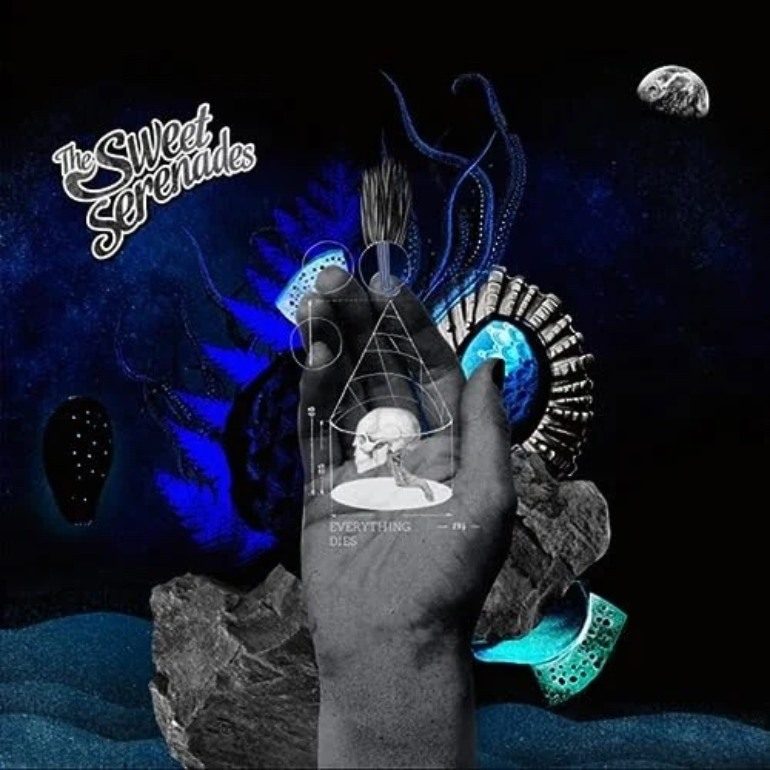

Good Intentions Don’t Always Guarantee a Good Delivery
The Sweet Serenades plays into life in his own way on Everything Dies. He’s an artist who makes music, but in this go, he hasn’t made anything new and awe-inspiring. Instead, this latest work is quite dull and uninspiring, one of the songs on it, “Shapes and Colors,” doing enough with its title to describe the vibe of the entire album. It has lackadaisically shaped, carefully colorless sounds and Martin Nordvall, doesn’t have the voice for pop music, most of the time it’s even challenging to take him seriously. Hearing him often evokes images of someone singing their way through the mundanity of retirement. The pitch and tone he’s going for would certainly work if this were a world dominated by George Orwell’s Big Brother character from 1984 and he happened to serve as a public speaker of sorts for him.
Calling a piece of one’s work Everything Dies in 2023 is an elementary decision—and not the good kind. By no means is it charming. There seemingly are no ties to 1980s pop on the album either, which could be seen as how it lacks any kind of connection to the genre it’s trying to both stand and make a name for itself in. Everything’s lazily put together, with simple productions.
Notwithstanding, certain tracks shine. “Akhilia,” if the overall use of instruments is to be mentioned again, features the most creative blend. It starts off with a magical marimba and hand drums, giving it a tropical feeling, as if it possesses the aura of something which was born deep in the heart of a rainforest. Still, the lyrics, whether indirectly or not, address subjects of basic natures; stating only the obvious. Sure, they attempt to be upbeat and motivational, but their total effect just isn’t. Countless singers have tackled the lyric “There’s a new day coming” in so many nuanced ways that for The Sweet Serenades to include it word for word in that way here, the result is lackluster. Arguably the best part of this track is its abrupt ending, since it fades off into nothingness quickly and painfully (cutting it off so calmly certainly can be noted as a poignant stylistic effect). However, to say that is to say a lot, especially considering that the song’s conclusion is what’s being commended, not any of the other parts that, so to say, actually make it the coherent thing it is.
All the lyrics on Everything Dies are boringly bland, it must be stated. On the opening track, for instance, Nordvall sings, “Forever is a lie / Everything dies.” If those aren’t cliche lyrics, what else could be? It wouldn’t be far-fetched to guess that most of them were written haphazardly and without many second thoughts. They try hard to be beautifully diaristic, but ultimately come up short. Their only saving grace might just be that they’re incredibly easy to understand, magnificently relatable and super straightforward. It’s clear, then, that The Sweet Serenades’ intentions with them were promising, yet there’s not much of any fresh draw to them. They are not too encouraging. Take this sample from “Walk Away” as an example: “If you wanna be alive, / Just walk away.” Upon closer examination, that doesn’t sound as helpful as it probably did when it was initially put down, as the level of ambiguity to that sentence is impressively high.
Everything Dies, lyrically speaking, suffers from too much similarity to tasteless aphorisms that most people likely know by heart but cast off with negligence. Its sound doesn’t curiously wander off from the land of genericity, unfortunately. That said, some elements of the album’s production aren’t totally unworthy of praise. Healthy synthesizers come and go and a humbucker screeches and rumbles majestically on one occasion. But that’s just not enough to make up for Nordvall’s monotonous cadence and weak stabs at compelling poetry.
